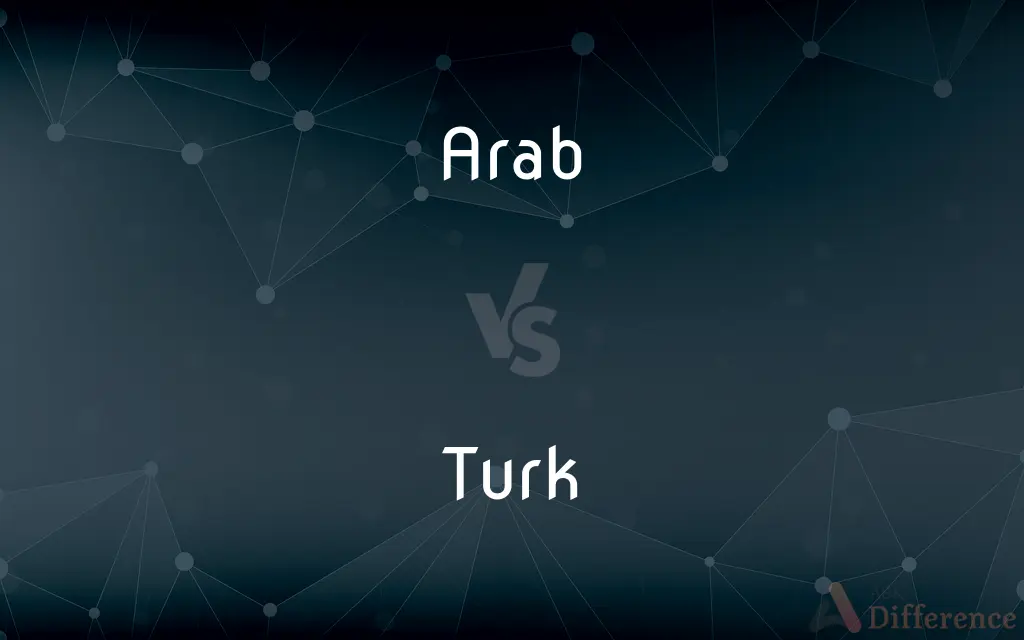Arab vs. Turk — What's the Difference?
By Maham Liaqat & Urooj Arif — Updated on April 3, 2024
Arab refers to people and cultures linked to the Arab world and Arabic language, while Turk relates to those connected with Turkey and the Turkish language.

Difference Between Arab and Turk
Table of Contents
ADVERTISEMENT
Key Differences
Arabs are primarily associated with the Arab world, which spans across 22 countries in the Middle East and North Africa, sharing cultural heritage and the Arabic language. This group has a rich historical legacy, including the spread of Islam and contributions to science, literature, and art. Turks, on the other hand, are connected to Turkey, a nation that straddles Europe and Asia. Turkish culture is a blend of Ottoman, Central Asian, Eastern European, and Middle Eastern influences, and the Turkish language belongs to the Turkic language family.
The Arab identity is closely linked with the Arabic language, a Semitic language that serves as a key element of cultural and religious identity among Arabs. Arabic is also the liturgical language of Islam, which plays a significant role in Arab culture and society. Conversely, the Turkish identity is tied to the Turkish language, which underwent a significant transformation in the 20th century from the Ottoman Turkish script to the Latin alphabet under Mustafa Kemal Atatürk’s reforms, marking a key point in the establishment of modern Turkish identity.
Historically, Arabs have had a profound influence on the development and spread of Islam, with the Arabian Peninsula being the birthplace of the religion. The Islamic Golden Age, under the rule of Arab caliphates, was a period of significant cultural, economic, and scientific flourishing. Turks, notably the Ottomans, also played a crucial role in Islamic history, ruling over vast territories in Southeast Europe, Western Asia, and North Africa for centuries, and contributing to the spread of Islam, especially in the regions they conquered.
Culturally, Arab societies are known for their strong traditions in poetry, literature, and philosophy, deeply influenced by the Arabic language and Islamic values. Turkish culture, while also influenced by Islam, reflects a diverse heritage that includes ancient Turkic elements, Ottoman traditions, and modern Western influences. Turkish cuisine, music, and literature have distinct characteristics that set them apart from Arab counterparts.
Arab and Turkish societies today reflect a blend of tradition and modernity, with both facing challenges related to identity, modernization, and regional conflicts. While the Arab world is grappling with issues of political instability, economic development, and cultural preservation, Turkey is navigating its role as a bridge between East and West, dealing with political, social, and economic issues unique to its geographical and historical position.
ADVERTISEMENT
Comparison Chart
Geographic Origin
Middle East and North Africa
Turkey, straddling Europe and Asia
Language
Arabic, a Semitic language
Turkish, belonging to the Turkic language family
Cultural Influence
Islam, Arab caliphates, Arabic literature
Ottoman Empire, Central Asian and Middle Eastern influences
Historical Contributions
Spread of Islam, Islamic Golden Age
Ottoman Empire, expansion of Islam in Southeast Europe and beyond
Cultural Characteristics
Poetry, literature, philosophy tied to Arabic and Islam
Diverse heritage including Turkic, Ottoman, and modern Western influences
Current Challenges
Political instability, economic development
Political identity, modernization, regional influence
Compare with Definitions
Arab
A member of a Semitic people inhabiting much of the Middle East and North Africa.
Arabs have a rich cultural heritage that spans thousands of years.
Turk
A native or inhabitant of Turkey, or a person of Turkish descent.
Turks have a proud history that dates back to the Ottoman Empire and beyond.
Arab
Associated with the historical spread and cultural influence of Islam.
Arab traders were instrumental in spreading Islam across Africa and Asia.
Turk
Pertaining to the Turkish language, which has undergone significant reforms.
Atatürk’s introduction of the Latin alphabet modernized the Turkish language.
Arab
Pertaining to the culture, language, or nations of the Arab world.
Arabic calligraphy is an important art form in Arab cultures.
Turk
Connected with Turkey’s strategic role bridging Europe and Asia.
Turkey’s geographical location has made it a crossroads of cultures and influences.
Arab
Reflecting the diverse societies and traditions within the Arab world.
Arab cuisine varies significantly from Morocco to Oman.
Turk
Reflecting the rich and diverse cultural heritage of the Turkish people.
Turkish music incorporates a wide range of influences, from Central Asia to Europe.
Arab
Related to the Arabic language, the lingua franca of the Arab world.
The Arab League works to promote cooperation among Arabic-speaking countries.
Turk
Relating to the culture, language, or history of Turkey and the Turkish people.
Turkish coffee is enjoyed as a traditional beverage throughout Turkey.
Arab
A member of a Semitic people inhabiting Arabia, whose language and Islamic religion spread widely throughout the Middle East and northern Africa from the seventh century.
Turk
A native or inhabitant of Turkey.
Arab
A member of an Arabic-speaking people.
Turk
A member of the principal ethnic group of modern-day Turkey or, formerly, of the Ottoman Empire.
Arab
An Arabian horse.
Turk
A member of any of the Turkic-speaking peoples.
Arab
One of a swarthy race occupying Arabia, and numerous in Syria, Northern Africa, etc.
The ragged outcasts and street Arabs who are shivering in damp doorways.
Turk
A member of any of numerous Tartar tribes of Central Asia, etc.; esp., one of the dominant race in Turkey.
Arab
A member of a Semitic people originally from the Arabian peninsula and surrounding territories who speaks Arabic and who inhabits much of the Middle East and northern Africa
Turk
A native or inhabitant of Turkey.
Arab
A spirited graceful and intelligent riding horse native to Arabia
Turk
A Muslim; esp., one living in Turkey.
It is no good reason for a man's religion that he was born and brought up in it; for then a Turk would have as much reason to be a Turk as a Christian to be a Christian.
Turk
The plum weevil. See Curculio, and Plum weevil, under Plum.
Turk
A native or inhabitant of Turkey
Common Curiosities
Who are the Arabs?
Arabs are people connected by the Arabic language and culture, primarily located in the Middle East and North Africa.
How did the Arabic language influence Arab identity?
The Arabic language is a cornerstone of Arab identity, deeply intertwined with culture, religion, and social norms.
What role did the Ottomans play in Turkish history?
The Ottoman Empire was a defining force in Turkish history, shaping its culture, language, and influence in the region.
What is the significance of Islam in Arab and Turkish cultures?
Islam plays a central role in both cultures, though its influence varies in practice and traditions across different Arab and Turkish communities.
How do Arabs and Turks view their historical contributions?
Both value their historical contributions, including the spread of Islam and cultural achievements, with pride and a sense of legacy.
What distinguishes Turks from Arabs?
Turks are associated with Turkey and the Turkish language, while Arabs are linked to the Arab world and the Arabic language.
How do Arab and Turkish arts differ?
Arab arts are deeply influenced by the Arabic language and Islamic motifs, while Turkish arts blend Eastern and Western traditions, reflecting its diverse heritage.
Are Turkish and Arabic languages related?
No, Turkish belongs to the Turkic language family, while Arabic is a Semitic language.
What challenges do modern Arab and Turkish societies face?
They face challenges related to modernization, political stability, economic development, and preserving cultural identity.
What are some popular Arab and Turkish cultural exports?
Arab literature, music, and cuisine, as well as Turkish drama, cuisine, and historical sites, enjoy international popularity.
How do Arab and Turkish cuisines compare?
Both cuisines offer a rich array of flavors and dishes, but they differ in ingredients, spices, and cooking methods due to their diverse cultural influences.
What impact did language reforms have in Turkey?
Language reforms modernized the Turkish language and aligned Turkey more closely with Western cultural and political norms.
Can someone be both Arab and Turk?
While rare due to distinct national and linguistic identities, there are individuals and communities with mixed Arab and Turkish heritage.
Share Your Discovery

Previous Comparison
Maltose vs. Amylose
Next Comparison
Silent vs. SilencedAuthor Spotlight
Written by
Maham LiaqatCo-written by
Urooj ArifUrooj is a skilled content writer at Ask Difference, known for her exceptional ability to simplify complex topics into engaging and informative content. With a passion for research and a flair for clear, concise writing, she consistently delivers articles that resonate with our diverse audience.














































